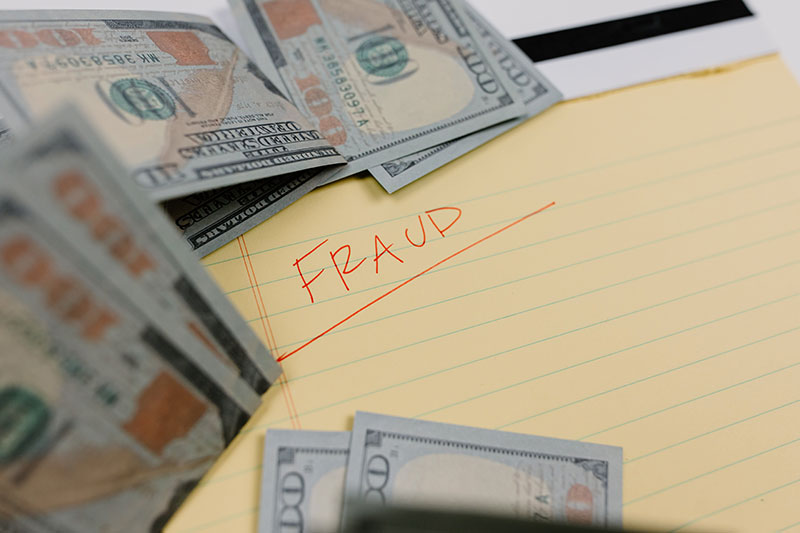What is White-Collar Crime? Meaning, Types, and Examples

White collar crime. You often hear the term from media and lawmakers, invoked to paint business leaders as criminally inclined. But what does it actually mean? And how is it different from other types of crime?
White-collar crimes are non-violent offenses committed through financial methods or for economic gain, often by means of deception, cheating, and breaches of trust. While complex in nature, white-collar crimes produce stark real-world consequences.
At Whalen Law Office, we’ve spent decades representing professionals, executives, and business owners facing a wide range of financial crime allegations. Over the years, we’ve become intimately familiar with all aspects surrounding white-collar cases. So, let’s break it down in simple terms.
Defining White-Collar Crime
Most dictionaries broadly define white-collar crime as a non-violent crime committed by an individual, typically for financial gain. But legally and practically, more precision is required.
The most cited definition stems from criminologist Edwin Sutherland, who coined the term in 1939. He described white-collar crime as a “crime committed by a person of respectability and high social status in the course of his occupation.”
Respectability. High status. Occupational. These modifiers get to the very essence of separating white-collar offenses from street crime.
Sutherland spotlighted the abuse of power and privilege by highlighting business owners, high-ranking executives, and elected officials who used their position, influence, and opportunity to illegally enrich themselves while eroding public trust.
Common Types of White-Collar Crimes
While definitions provide orientation, real-world examples make concepts concrete. White-collar cases run the gamut but typically fall into several major categories.
Fraud
This broad category covers deceitful schemes to unlawfully obtain money or property from victims. Common fraud cases we see include:
- Securities Fraud – Insider trading, market manipulation, or making false statements to investors about stocks.
- Ponzi Schemes – Using new investor money to pay earlier investors extremely high fake “returns” on investments that don’t actually exist.
- Tax Evasion – Illegally hiding income, lying about deductions or exemptions, failing to file returns or pay taxes owed.
- Embezzlement – Theft of money or assets by employees or fiduciaries legally entrusted with funds.
- Wire & Mail Fraud – Use of phone, mail, or internet to intentionally transmit fraudulent representations or money obtained illegally.
- Healthcare & Insurance Fraud – Doctors billing for services not performed, illegal kickbacks, exaggerated or fake claims submitted.
Theft/Embezzlement
Theft involves taking money or property in unauthorized or illegal ways, including:
- Employee Theft – Stealing cash, inventory, equipment, or data from an employer.
- Skimming Revenues – Collect payments but fail to properly record transactions, keeping the difference.
- Expense Reimbursement Schemes – Submitting inflated, altered, or fake business expenses for reimbursement.
Money Laundering
Disguising the origins of money obtained from criminal activity by hiding it within legal channels. Techniques include:
- Running dirty money through legitimate cash businesses like restaurants to clean.
- Structuring cash deposits to evade mandatory reporting requirements.
- Using complex international wire transfers through shell corporations to obscure audit trails.
Bribery of Public Officials
Offering inducements to public officials to influence decisions or outcomes. For example:
- Steering government contracts or procurement deals to certain vendors by bribing decision-makers.
- Exchanging political donations or gifts for support of legislation or other government action.
Cybercrime
With exponentially growing digital connectivity comes greater cybercrime opportunities, including:
- Hacking – Breaching organizations or accounts to steal valuable personal data for exploitation or resale.
- Identity Theft – Stealing consumers’ personal information to execute fraud schemes by creating fake accounts for profit.
- Online Scams – Internet schemes using false promises to solicit payments from victims who receive nothing in return.
Intellectual Property Theft
Stealing trade secrets or protected proprietary information provides insider competitive advantages, for example:
- Trade Secret Theft – Former employees steal sensitive company data to start rival firms or sell secrets.
- Software Piracy – Illegally reproducing copyrighted software programs for sale or distribution.
- Counterfeiting – Manufacturing knockoff versions of patented goods or media content.
As evidenced above, white-collar crime encompasses a wide continuum of deceitful schemes to unlawfully enrich the perpetrator. The common denominator typically involves abusing special skills, access, or trust.
Most white-collar cases involve deceit, deception, secrecy, and violation of trust. More on this shortly when highlighting real-world examples.
Examples of White-Collar Crimes in the Real World
While white-collar crime may seem like a conceptual topic, it materializes in troubling situations in the business world daily. This section outlines real-world examples of these types of crimes.
Bernie Madoff’s Wall Street Ponzi Scheme
Perhaps the most infamous white-collar criminal case example remains Bernie Madoff’s enormous Ponzi scheme. The former NASDAQ Chairman swindled investors out of $65 billion dollars over decades by promoting promised, consistent, high returns.
In reality, there were no real investments being made. Madoff used money from new investors to pay earlier investors – the central conceit behind every Ponzi scheme. His fraud was finally exposed during the 2008 financial crisis when too many investors sought to cash out.
Madoff pleaded guilty to an 11-count criminal indictment, including securities fraud, wire fraud, mail fraud, and money laundering. He received a 150-year federal prison sentence. Trust takes a long time to build but moments to shatter.
Enron’s Accounting Lies Implode an Energy Giant
In another notorious case, dubbed the Enron Scandal, Enron grew into one of the world’s largest energy conglomerates in the 1990s by cleverly hiding billions in debt and losses through fraudulent accounting tricks.
Behind the scenes, Enron executives enriched themselves with huge bonuses and stock profits derived from falsely inflated earnings reports. As hidden losses mounted, the scheme unraveled, and Enron plunged into bankruptcy in 2001. Investors lost $74 billion in the aftermath.
Multiple federal agencies, including the FBI and SEC, investigated the massive accounting fraud. CEO Jeffrey Skilling received 24 years in federal prison for multiple counts of conspiracy, fraud, and insider trading. Finance chief Andrew Fastow, the mastermind behind Enron’s web of off-the-book fraudulent companies, cooperated with authorities in the probe and ultimately served a 6-year sentence.
The Con Man Who Gave Ponzi Schemes His Name
If there were a white-collar crime hall of fame, Charles Ponzi would have a special wing dedicated in his honor. Before Bernie Madoff, Ponzi originated the type of financial fraud scheme that still bears his name to this day.
In the early 1900s, Ponzi started a business buying and selling postal reply coupons redeemable for stamps. He promised investors massive returns in very short periods – a 50% return in 90 days.
Ponzi generated real excitement about the returns he was paying early investors. Money poured in. At its peak, Ponzi took in over $1 million a week from eager investors, unaware no actual investments were happening. He simply used new money to pay old investors and diverted the rest for his own lavish spending.
Eventually, the Ponzi scheme collapsed. He was convicted of mail fraud and sentenced to 5 years in federal prison. Upon release, he was deported and continued his con man ways in other countries before dying penniless in Brazil.
Charles Ponzi was the original white-collar criminal con man. His legacy lives on today in boiler room operations, using high-pressure sales tactics to peddle fraudulent investments on unsuspecting victims.
Penalties Can Be Severe for White-Collar Convictions
Given the lack of violence and often high social status, you might assume white-collar offenders receive light punishment. Quite the opposite—criminal penalties can be severe under federal sentencing guidelines. Consider:
- Long Prison Sentences – Decades or more in high-security federal prisons
- Massive Fines – From hundreds of thousands up to millions and even billions of dollars
- Asset Seizures – Cash, property, and business assets seized
- Restitution Payments – Court ordered payments to victims
- Exclusion Bans – Banned from the securities industry or directing public companies
- Reputational Ruin – Public stigma and loss of social/professional status
Make no mistake — a federal white-collar conviction can ruin careers, livelihoods, families, and legacies in one fell swoop.
Why Hiring Experienced White Collar Counsel Matters
Given the many severe direct and collateral consequences, building the best possible defense case from moment one remains imperative for white-collar defendants.
An experienced federal white-collar defense lawyer brings case-tested guidance, including:
- Investigating red flags flagged internally or by regulatory/enforcement agencies
- Advocating cooperation credit for early acceptance of responsibility
- Negotiating deferred prosecution or non-prosecution agreements to avoid charges
- Mounting complex pre-trial motions to suppress evidence or dismiss charges
- Navigating federal sentencing guidelines to mitigate outcomes
At Whalen Law Office, no one understands white-collar criminal defense better than our partners. For years, we have successfully defended thousands of clients facing allegations like fraud, embezzlement, money laundering, and more.
If you or someone close to you requires experienced counsel in response to federal white-collar allegations, we encourage you to reach out for frank, honest case guidance. Every matter we handle receives partner-level personal attention from our litigation team.
Schedule your confidential criminal defense case consultation today.



